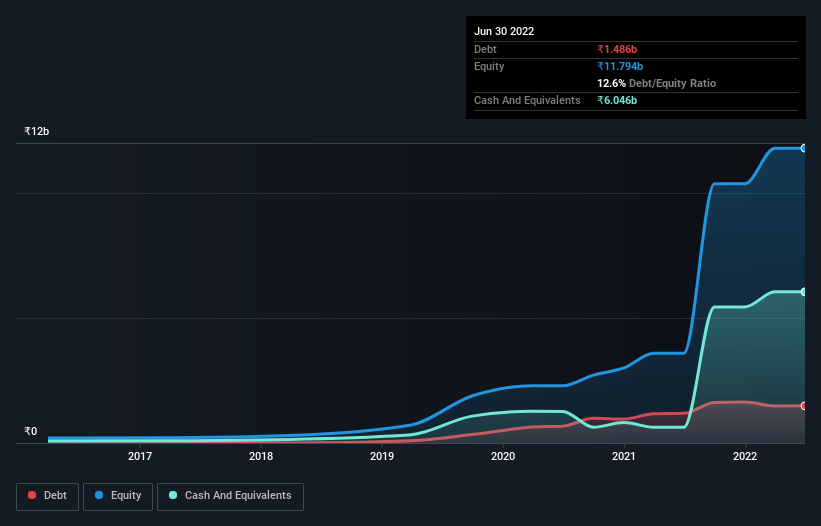Some say volatility, rather than debt, is the best way to think about risk as an investor, but Warren Buffett famously said that 'Volatility is far from synonymous with risk.' So it seems the smart money knows that debt - which is usually involved in bankruptcies - is a very important factor, when you assess how risky a company is. As with many other companies Affle (India) Limited (NSE:AFFLE) makes use of debt. But the more important question is: how much risk is that debt creating?
When Is Debt A Problem?
Debt is a tool to help businesses grow, but if a business is incapable of paying off its lenders, then it exists at their mercy. Ultimately, if the company can't fulfill its legal obligations to repay debt, shareholders could walk away with nothing. While that is not too common, we often do see indebted companies permanently diluting shareholders because lenders force them to raise capital at a distressed price. Of course, plenty of companies use debt to fund growth, without any negative consequences. The first step when considering a company's debt levels is to consider its cash and debt together.
See our latest analysis for Affle (India)
How Much Debt Does Affle (India) Carry?
As you can see below, at the end of March 2022, Affle (India) had ₹1.49b of debt, up from ₹1.19b a year ago. Click the image for more detail. However, its balance sheet shows it holds ₹6.05b in cash, so it actually has ₹4.56b net cash.

How Healthy Is Affle (India)'s Balance Sheet?
Zooming in on the latest balance sheet data, we can see that Affle (India) had liabilities of ₹4.29b due within 12 months and liabilities of ₹2.19b due beyond that. On the other hand, it had cash of ₹6.05b and ₹3.12b worth of receivables due within a year. So it actually has ₹2.69b more liquid assets than total liabilities.
Having regard to Affle (India)'s size, it seems that its liquid assets are well balanced with its total liabilities. So while it's hard to imagine that the ₹167.8b company is struggling for cash, we still think it's worth monitoring its balance sheet. Succinctly put, Affle (India) boasts net cash, so it's fair to say it does not have a heavy debt load!
On top of that, Affle (India) grew its EBIT by 73% over the last twelve months, and that growth will make it easier to handle its debt. When analysing debt levels, the balance sheet is the obvious place to start. But it is future earnings, more than anything, that will determine Affle (India)'s ability to maintain a healthy balance sheet going forward. So if you want to see what the professionals think, you might find this free report on analyst profit forecasts to be interesting.
Finally, a business needs free cash flow to pay off debt; accounting profits just don't cut it. Affle (India) may have net cash on the balance sheet, but it is still interesting to look at how well the business converts its earnings before interest and tax (EBIT) to free cash flow, because that will influence both its need for, and its capacity to manage debt. Over the most recent three years, Affle (India) recorded free cash flow worth 57% of its EBIT, which is around normal, given free cash flow excludes interest and tax. This cold hard cash means it can reduce its debt when it wants to.
Summing Up
While we empathize with investors who find debt concerning, you should keep in mind that Affle (India) has net cash of ₹4.56b, as well as more liquid assets than liabilities. And it impressed us with its EBIT growth of 73% over the last year. So is Affle (India)'s debt a risk? It doesn't seem so to us. The balance sheet is clearly the area to focus on when you are analysing debt. But ultimately, every company can contain risks that exist outside of the balance sheet. Case in point: We've spotted 1 warning sign for Affle (India) you should be aware of.
If, after all that, you're more interested in a fast growing company with a rock-solid balance sheet, then check out our list of net cash growth stocks without delay.
New: Manage All Your Stock Portfolios in One Place
We've created the ultimate portfolio companion for stock investors, and it's free.
• Connect an unlimited number of Portfolios and see your total in one currency
• Be alerted to new Warning Signs or Risks via email or mobile
• Track the Fair Value of your stocks
Have feedback on this article? Concerned about the content? Get in touch with us directly. Alternatively, email editorial-team (at) simplywallst.com.
This article by Simply Wall St is general in nature. We provide commentary based on historical data and analyst forecasts only using an unbiased methodology and our articles are not intended to be financial advice. It does not constitute a recommendation to buy or sell any stock, and does not take account of your objectives, or your financial situation. We aim to bring you long-term focused analysis driven by fundamental data. Note that our analysis may not factor in the latest price-sensitive company announcements or qualitative material. Simply Wall St has no position in any stocks mentioned.
About NSEI:AFFLE
Affle 3i
Provides mobile advertisement services through information technology and software development services for mobiles in India and internationally.
Flawless balance sheet with reasonable growth potential.
Similar Companies
Market Insights
Community Narratives



